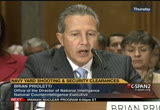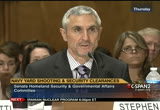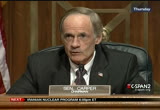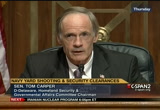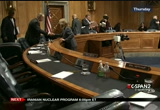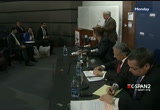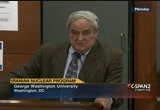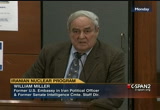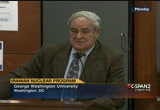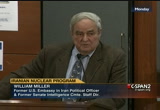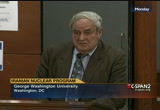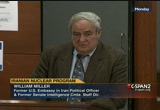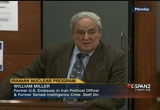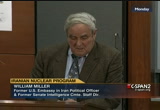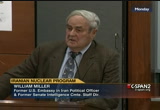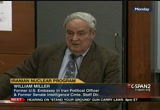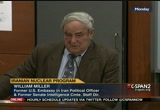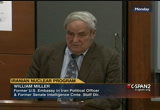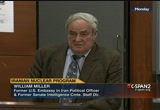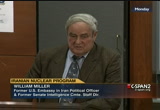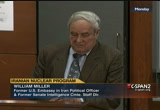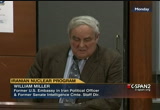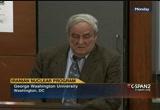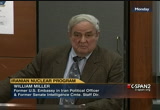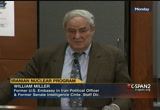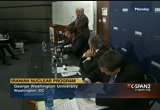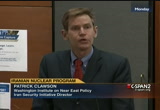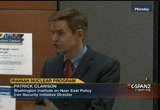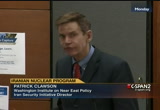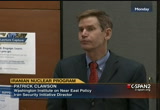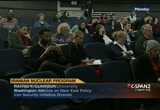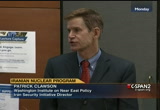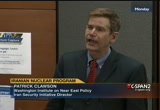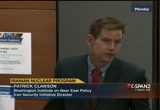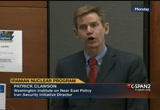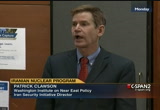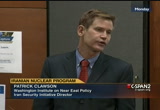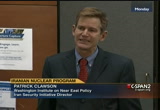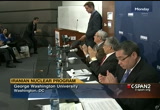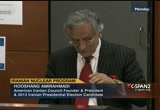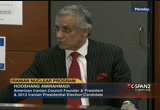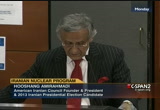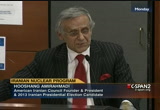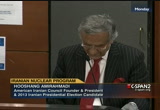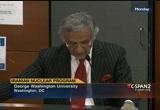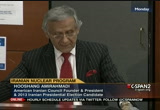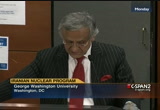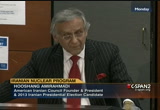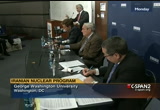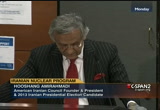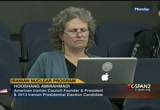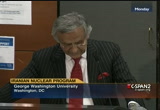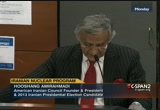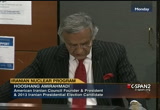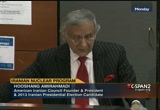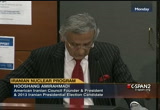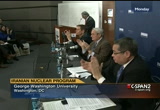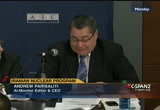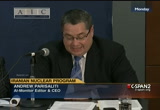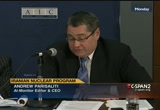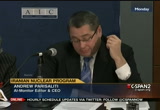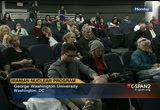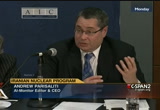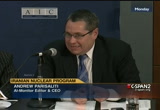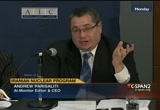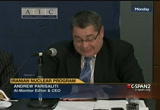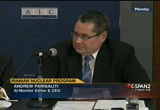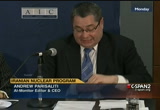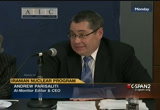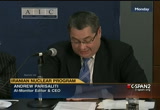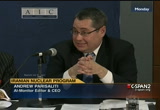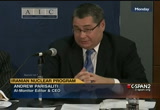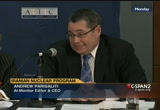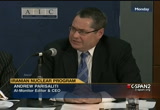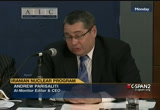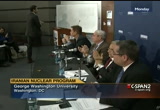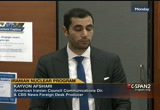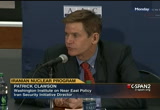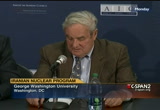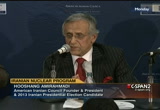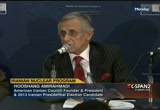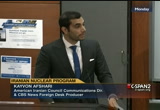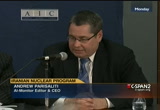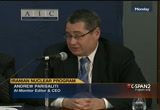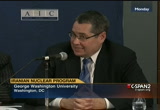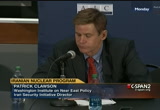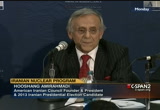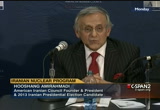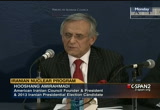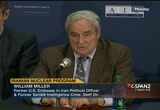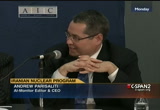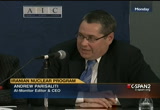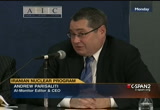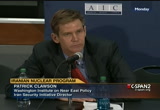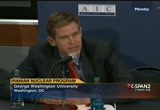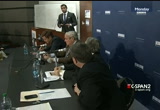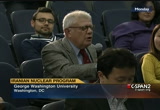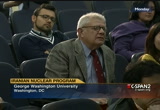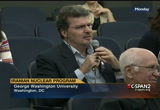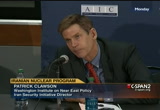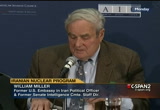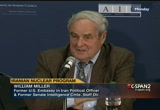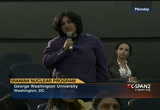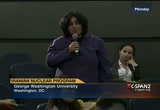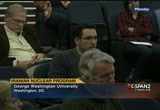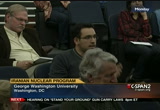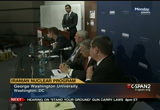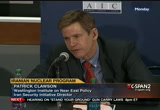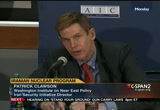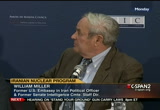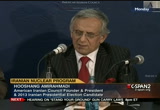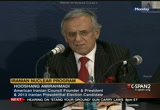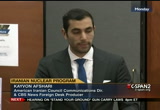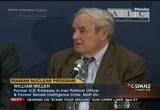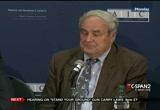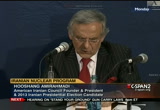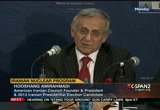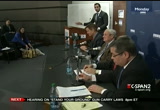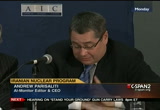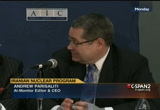tv Key Capitol Hill Hearings CSPAN November 1, 2013 6:00pm-8:01pm EDT
6:00 pm
there are no words to describe this loss. a gashe teed commitment that we'll continue to work to find the solution. this is an evolutionary process as we find gaps in our processes and the way we do our business, we will continue to utilize those to come up with the best possible process to improve how we do our business on behalf of the u.s. government as well as the u.s. citizens. >> thank you, sir. >> in addition to what my fellow witnesses have had to say, i would just add that we need to make a commitment and effectively ensure that what happens between investigations is something that is tracked. we've had people -- we vet people, we trust them with our classified information and
6:01 pm
access to sensitive facilities and we have an obligation to ensure that we're looking at people between investigations and taking appropriate corrective action as needed. >> thank you. >> i would say it's unfortunate that the tragedies we saw at the navy yard focuses attention on this process but we have seen the dedicated leadership from these executive branch agencies in the past and when they make their minto and when they make their mind up to take on a problem in father, they do it. and now is the time for actions, not just reviewed words. >> a lot of the folks in the room now that the general accountability office is regarded as a watchdog. an arm of the legislative branch of our government, a watchdog for the whole expansive
6:02 pm
government is a huge job. a lot of people do it. evidently not enough. but we need your continued vigilance to help us do our job and that the oversight. i think probably the most quoted things that ronald reagan is when he said to mr. gorbachev is tear down this wall. the berlin wall was torn down. he also used to say when he was trying to negotiate reductions in nuclear arms with the soviet union, he was say entrusts reverify. all of them this committee or staff as well trust you and we trust the goodwill of the folks who are responsible for carrying through on these reforms and make sure not just words, but actions to back it up. so we are trustful. this committee is going to be
6:03 pm
concert with g.i. and doing verification along the way. ms. kaplan, as you go on your next assignment, we wish you well. we appreciate the time given with us today. even more, we appreciate the commitment in your case, ms. kaplan, will follow you and those of us to be served to make sure that these words in this promise is a promise we keep. that having been said, this hearing is adjourned. thank you so much. [inaudible conversations] >> national intelligence or
6:04 pm
james clapper and nsa direct or general keith allen discussed the nsa surveillance program and spying on foreign governments before the house intelligence committee hearing earlier this week. >> i never expected to write an entire book on cancer until i was diagnosed at a relatively young age. i was diagnosed at 36. i was astonished at how different i thought it was -- how different i was going through treatment than what i had heard about cancer and what i expected cancer be. and i sort of expected it -- i expected it to run like a well oiled machine in which cure wasn't obviously guaranteed, but people knew about my particular cancer at be followed and what i
6:05 pm
found was being really, really different. i couldn't help but i started to write about it. >> the head of the wrecks on trans next round of talks, george washington university hosted regional experts were monday. a farmer winning presidential candidate and former official at the american embassy in a rant to our commenting on prospects for the agreement. the impact of president rouhani election. nuclear weapons talks begin on november 7. >> thank you very much. it's a pleasure to be here to talk on the possibility of
6:06 pm
having a normal, peaceful relationship with the ran. and it seems to me and i'll declare my opinion at the outset that this is the best chance we've had the revolution. it's 34 years now. and we should make every effort to see if it can work. and i'll go through it that effort would entail. first is the nuclear question. does iran have any nuclear weapons? the answer from all intelligence sources and from the iaea and the expert community is that it
6:07 pm
has no nuclear weapons. does it have the capacity to build nuclear weapons? and the answer is yes, it does have the capacity. and that's the dilemma, having the capacity, can you trust monitoring and verification sufficiently to be able to take remedial action if the peaceful path is abandoned and iran goes down the path to acquiring its own nuclear weapons. that's the task that was set before our nation and the npt and all the signatories to the npt are devoted to that task.
6:08 pm
to prevent proliferation of nuclear weapons and to encourage those nations that have nuclear weapons to reduce their stocks, hopefully to zero. certainly the united states and russia in states of the former soviet union have taken to heart the effort to reduce their weapons stocks. there are far too many in the world and other nations have acquired nuclear weapons and the recent past. israel, pakistan, india. in a volatile middle east.
6:09 pm
is there any belief -- is there any reason to believe that iran would follow a peaceful path for the foreseeable future? there's quite a bit of seven and that will be the case. starting with the joining of the year ran to the npt shortly after the formation of the non-proliferation treaty regime under the shah, continuation under the revolutionary government. initially, there were questions about the use of weapons of mass
6:10 pm
destruction, which covered beyond nuclear weapons, chemical weapons, poison gas, biological weapons. that is the use of natural and unnatural toxins. iran was faced with a to l-lima in the first years of the iran-iraq war. saddam hussein supported in many countries in the west and including my own use chemical weapons, poison gas against the iranian forces. there were many casualties. tens of thousands. many of whom are suffering
6:11 pm
today. those that survived the attack. the question was raised at the ukrainian military with the ayatollah khomeini, should we retaliate in kind? may we have the authority to do so? they're killing us and we have to retaliate. khomeini answered very directly, giving an order that chemical weapons could be used. weapons of mass destruction, including chemical web ends, nuclear and biological were forbidden by islam.
6:12 pm
this is the first of eight fatwa issued in the iranian context. the very early on, a context was established, where he ran would have no weapons of mass destruction, relying upon its conventional forces for defense of the realm and where it was able to work out a stalemate with the invading forces from iraq under saddam hussein after eight years of disastrous costly and treasure and minimize war. so the record from the outset
6:13 pm
has been against the use of weapons of mass destruction. however, there is the capability and i know a little bit about capability. i've studied at for much of my adult life. it happens when i was assigned to iran as a diplomat in 1959 with my accompanied david landau, former head of the atomic energy commission on this trip around iran. he was in retirement. he was head of an energy company
6:14 pm
that worked at the plant organization of iran on its energy needs for the coming century. and he developed a plan of hydro- gas-fired, coal-fired and nuclear power plants that would supply the energy needs of iran. and that original plan had a proposal of 22 reactors, nuclear reactors. of course that was a grand plan, not feasible in the immediate circumstances, but certainly over the long term.
6:15 pm
it was a part of the vision of the united states government, of atoms for peace, where we fostered the development of nuclear energy for peaceful purposes, and including lining diversion never occurs -- of rivers and the production of energy and the desalination of seawater for agricultural purposes. lilienthal's argument as i recall it was that he ran should use its oil and gas resources not for its own energy, but for sale a broad, export that they should develop their own
6:16 pm
infrastructure from the proceeds from the sale of oil and gas and use the value resources, which were finite in nature to develop a sound infrastructure of energy production. so that was the american vision in 1960. of course, the world learned of the dangers of nuclear power plants, three-mile island, chernobyl. and i know quite a bit about chernobyl, having served quite near there. and have seen the effects of
6:17 pm
runaway reactors and the dangers inherent in the long-term costs. now of course we've learned, to, that are nuclear programs have been cut back and we are looking desperately for safe nuclear reactors in new technologies that won't make the vision of the 50s and 60s by reality. i dwell on this because the shah embraced this and the present revolutionary government has embraced this as well. and we are the authors.
6:18 pm
we are the authors in many ways. most of the nuclear scientists in iran, both physicists and engineers, tennis, people who put things together build power plants, are educated and trained in the west, particularly in the united states. and that's the case now. aliyah art salé, who was presently once again height of the atomic energy program for iran is an m.i.t. graduate, phd and his subject is the physics of nuclear power plant.
6:19 pm
the present leadership under president rouhani is very familiar with the issues that i've just correlated. and including the detailed knowledge of the programs that iran has embarked on over the 50 years that they have pursued nuclear energy research and development. and their position, their declaratory position is that we have no interest in nuclear weapons, although we are surrounded by nuclear weapons,
6:20 pm
although we can build nuclear weapons, but we can only build a few. and if we built them strategically, we will become even more vulnerable as a target for retaliation. so this is the declaratory policy. this is the strategic policy and this is buttressed by an ethical and religious view that many iranians poll that weapons use of weapons of mass destruction is forbidden by the teachings of islam. and i would hasten to add that the three great muscle you stick religions, all hold the same position on the use
6:21 pm
indiscriminately against civilians. so this is the background. what is the reality that we face now? we have a government that has come to power by election, by popular election day season and. they have been involved in negotiations on the nuclear question and negotiations with the united states before. in fact, for much of their adult life. they are very good. and i can say that having spent the last month in new york, meeting with them, listening to
6:22 pm
them and watching the reaction of our government to their behavior and proposals. they are very good. there is good diplomat says he will find anywhere the world. and i say that as a person who has been involved in policy almost all of my life. they're very good and they know what they're talking about. and it seems to me that for the first time in her four years, we have a congruence of national leadership in iran, popularly elected, supported by the supreme leader, experienced in
6:23 pm
that we should make every effort to test the proposition of whether we can come to terms with them. the terms are very clear. no nuclear weapons. the ability to monitor all of the peaceful activities of the ran with full transparence -- transparency and access, particularly through the iaea, the monitoring arms of the non-proliferation treaty. i'm very optimistic that there's a chance of success, but it will require an active well on the part of our leadership and a leadership and the testing
6:24 pm
ground began in new york last month. it was continued in geneva and will be continued in 10 days or so again in geneva and throughout the coming year. i think they could reach agreement very quickly on technical grounds particularly gaining national approval is a much harder task. we know at the strength of our lobbies are. we know what past attitudes have been. the sting of humiliation that to place when the hostages were taken remains in our psyche, our
6:25 pm
national psyche. and we have much political work to do you. when i say we, a suite of people, but it's mainly after the obama administration to make the case to congress that has to agree in large measure. a similar case pertains in iraq. whether the great can be removed as the bogeyman is a pertinent question. we'll see. we'll see and i'm one of those who believe that not only our dreams possible, but i think that our president and the
6:26 pm
leaders of our country are wise enough and experienced enough to seize the opportunity. thank you. [applause] >> thank you very much, ambassador miller. our next speaker to answer the question, dr. patrick clawson. from the washington institute. [applause] >> ambassador -- i hope is quite correct. but what i thought i would do is discuss a different topic. and that is some of the barriers that may remain to a close working relationship between the iranian and american governments in the event that there is a nuclear agreement. and it's useful for us to recall
6:27 pm
that there are a wide range of other issues on which the two governments differ. and to take one very obvious example, the united states government has now for 30 years listed the arabian government as the seaport terrace of the world. i testified some 30 federal court cases and an expert witness, douceur court cases brought by the victims of a running sponsor terrorism. and i remember one of the early cases the judge asked me, excuse me mr. clawson, but what evidence do you have your lan supports has a lot? i said well, aransas hezbollah support them. the u.s. government says iran supports them. the government of lebanon says iran supports them. judge says it seems pretty not a difficult thing to cry about.
6:28 pm
and i cannot see iranian government pressing off its relationship with them. and given hezbollah sec to the ddc is in syria, hezbollah gave one of the speeches today. it was quite eloquent. i cannot see the united states government taking hezbollah off of the terrorist organization. it's a barrier. for instance, quite a number of sanctions the united states placed with iran are listed as being either because of the rains were terrorism or a variety of reasons. nuclear impasse, and iran supported terrorism, human rights reasons. and it's going to be quite difficult. this is a real problem that we
6:29 pm
have. and we also have the problem that not only do we know well too little better brand, but frank the iranian leaders know relatively little about us. rouhani and his team are in many ways the last remnants of the generation that knew the united states very well were trained in the native states. and as a large group of leadership, including many younger leaders who do not have that kind of close intimate contact with the outside world at all, much less with the west. much less with the united states. and this is the problem. in fact, lack of experience leads them to take some of the remarkable position and to misunderstand u.s. politics. hot so i frankly think there's a
6:30 pm
lot of carriers to having close relationships between the two governments. but what about correct relations? all during the years -- almost all during the years of the cold war, the united states had correct relations. not good relations, the correct relations. that kind of correct relations can be very useful but defusing tensions and also allowing people to people contact, even if they disagree. and so, let us ask what is the possibility we can achieve at least that level of rapprochement of where we can have a third of easier people to people contact with iran. while there i hope i'm wrong. but i have to tell you that i am
6:31 pm
a pessimist because of the attitude of iran's supreme leader. in many of those who support him. the supreme leader has famously said the negotiations between the united states and iran are like negotiations between the landlord of the wolf. not an encouraging analogy.. not an encouraging analogy. but here i'm not referring to his suspicions about the united states government as i hand to his attitude that the greatest danger to the islamic republic is cultural edition of the west. this has been one of the most important themes of the last 20 years he's been in office. and he has warned that the cultural edition of the west converts iranian life, especially religious
6:32 pm
sensibility. very nice little brochure -- from the carnegie endowment for the national peace for my work called reading khamenei, which has lots of examples from this viewpoint. one of my favorites is the name he comes back to several times, explaining that miniskirts are much more dangerous than tanks because miniskirts can confuse the young soldiers into not being able to fight and this is a danger the islamic republic faces. furthermore, his view about the risks of cultural invasion added to this is concerned about what is often called a soft overthrow, but revolution by
6:33 pm
friends to czechoslovakia and call me names favorite expression, post moderate imperialist. where he said with the great powers to these days if they don't seek usually to invade and rule of their countries. they seek to overthrow its government by promoting people to people contact, nongovernmental organizations and the use of radio satellite television and the lake. so his vision of what threatens iran was well captured by that moment of michelle obama except dean the academy award for arcaro and that his vision, his cultural invasion of western ideas, which he thinks is organized and supported by the
6:34 pm
united states government. and he is convinced that what hollywood does it sound and they've closely worked out with washington. not all of us in washington see those relationships, but i a few years ago at the reigning government in the woodrow wilson center's middle east program, which he went to iran to visit another well-off into her 80s. he was a respected person who's done a great job trying to promote u.s. iranian relations and there were many around the world in the 22 governments who asked the government to release her and under some pressure explained while they were still holding her as a television put on a program in which they explained that she was part of this government revolution planned and they had as an
6:35 pm
illustration of how this plan proceeds. they showed in animated form these for iranian agents receiving direction from the weekly meeting george bush was having a church service in the white house to discuss the revolution in iran. not all of us knew mr. soros and mr. bush were so close. he tells me it was really very difficult to have to explain to the young people how washington were. but this attitude on the part of supreme leader is what makes him suspicious of people to people contact. and why he thinks that people to people contact, which received as people may have political difference is. but surely we cannot ordinary
6:36 pm
people to people contacts. well, as far as the supreme leader is concerned, his great concern is the cultural division and is organized at the level of the u.s. government for the revolution. so i hope we can overcome that. i certainly can say that almost all of mr. rouhani are people of that viewpoint because they understand while certainly the united states government does have spies that they ran, spinning the intelligence agency. but that the arena government understands this more benefits to iran and they're not going to do these kinds of silly things with the university professors that a suspicious money right and e-mail.
6:37 pm
so i would hope that we can get more people to people contact with this new route. but i just know there's certainly some in iran who are opposed. the u.s. government is all so shall we say cumbersome, slow and suspicious and this can create a great any barriers to normal commerce and normal people to people relations. our bureaucracies can be bad about competing with the situations. but we've got a very nice study at shepherd publications by alumnus at this university of identifying the problems they face. the deep dark secret in the polling we've done of her radiant students in the united states is 92%. and maybe very worthwhile to
6:38 pm
bring the reigning and tier two the ninth states. but let's be honest, this is war and immigration policy, or merely people to people exchange. so we don't have reasons for suspicion. and so in particular, because of the mutual suspicions between iran and the united states, i think any progress pers rapprochement is likely to come in a later case. i'm an optimist and i hope it can happen both of the nuclear impasse. the folks are pushing a very heavy rock up a hill. [applause] >> thank you, dr. clawson. our third speaker will be set up
6:39 pm
to, founder and president of the american iranian council. [applause] >> first, welcome and good afternoon. i want first to take this opportunity to thank you, mr. clawson and john and kayvon and the people who had done this. i'm very fortunate to have the behind these activities. i am hoping that one point they take the leadership of organizations back and i'm sure they will. [inaudible] >> you don't hear that? [inaudible] spin out okay, shout. i'm sorry. i was just saying that i'm honored to have these young people, rouhani, john and away
6:40 pm
the behind this work, these young people that hopefully in the near future there will be leading organizations like aat forward with u.s. foreign relations. after years of noncommunication or miscommunication, the united states and iran are in direct dialogue over iran's nuclear program. this is a great big deal. we know what has happened or what has been achieved so far. but the question is will the engagement lead to a settlement? that's the real question. while the engagement between settlement? there are those who say the deal is all but todd.
6:41 pm
they see no chance for us for a breakthrough. and the realists who see the development as an historic opportunity that is constrained by serious challenges on both sides. more significantly, there are the supporters and the factors. the latter remains dominant in both size. they are increasingly coming defense says, given the lack of better alternatives to dramatic solution. the pact is more western sanctions have resulted in more
6:42 pm
iranian centrifuges and enriched uranium at progressively higher grades. they have indeed deserve themselves for diplomacy. they offer the five plus one group of nations and more reasonable deal than in the past. the continuation of the existing sanctions for adding more to them will not make iran capitulate more. serious nations have headlined. on the contrary, more sanctions will seriously make here and continue on the current nuclear
6:43 pm
path, resulting more likely than not to an american military attack and all an iranian nuclear call. for over two decades, i have consistently bad on the side of the realists and the support, knowing well that traveling the bumpy road, washington and tehran needed as much realism and support as possible. and i never wavered in my belief that one day sooner or later the two governments would arrive at the mutual and official destination. that time might have come.
6:44 pm
at that time might have come and they must be more than ever before to support the current engagement with a sense of of course realism. evidence suggests that governments see it in the best interest to set up the nuclear dispute at the intersection of iran's rights to peaceful nuclear technology and america's requirement that iran never built a nuclear bomb. more significantly, after years of mutual mistrust, the two sides came to take that deal is possible. and within reach, they are not
6:45 pm
wrong in this assessment. while the details remain confidential from the media leaks, we know the key parameters emerging. he ran as expected to significantly slow the pace, narrow the scope, limit the amount and reduce the great bubble of its nuclear enrichment. the country is also expected to allow access and intrusive intersection of this nuclear sign by accepting the iaea's additional quote. what iran may not be last given this deal with a practical nuclear problem is nevertheless
6:46 pm
claim to have gained its quote, unquote and alan noble nuclear rights. in return for such a symbolic state for iran's nuclear program, president rouhani expects to receive and indeed must receive significant if not torture to the multilateral and unilateral sanctions. otherwise, he would not be able to deliver the deal. this is where i believe the challenge lies. how will the two sides reciprocate the leaping sanctions for enrichment? logically, they should be able to devise an incremental
6:47 pm
approach of give-and-take. practically however, the approach requires a level of mutual trust and confidence but unfortunately they still lack. complicating the situation is the pressure from the detractors in iran, the fundamentalists want president rouhani to then give. that is sanctions relief to proceed. in the u.s., the hopes what president obama to first take and then gave. that is enrichment limit to precede sanctions limit.
6:48 pm
and there's offers for how there is beyond the two countries, which do not want a give and take. they want to take us all. can the two governments overcome the challenges of mistrust and devise a fair, incremental procedure? president rouhani -- president rouhani currently has support from the supreme leader, who does not have trust in the u.s. that remains conditional on hand, that is president rouhani been able to significantly reduce sanctions and free iranian frozen asset.
6:49 pm
through the support, rouhani's nascent government faces challenge from the conservative, religious rifle who lost the election, but remained strong. the conservatives do not trust the u.s. to view it as weak and do not think that iran needs to make serious compromises to settle the nuclear dispute. they consistently remind president rouhani of america's economic problem and its difficulties in afghanistan, iraq, syria, libya and egypt among other nations. at the same time, they choose to ignore their own problems. president rouhani's rivals are
6:50 pm
already accusing him of being quote, unquote naïve and oblivious to the american, quote, unquote dishonesty. they also see the secrecy trend in the negotiations against their islamic nation. yet the main problem president rouhani faces is time. to maintain support and keep arrival, he must reach her brief will deal with the u.s. and e.u. sanctions significantly, all within a great amount of time. there's another reason for president rouhani desire to settle the nuclear history within the shortest possible
6:51 pm
time. and this coming february. unless president rouhani demonstrates result to reduce public support and his rifle would use the opportunity to gain even more seats in the parliament and then use that to threaten his administration. by opening to the u.s., president rouhani has paid a serious risk, make in himself responsible to the american wind and his domestic opponents. no wonder that he seriously want to make compromise as much and as fast as possible and gave a
6:52 pm
contortionist session on sanctions. so, unless president obama, now here is the case. unless president obama is willing and able to help, president rouhani would have a short honeymoon and a chance for breakthrough with the islamic republic. but the challenge is president obama faces are no less serious. though they are more manageable. many of the sanctions are written them off and controlled the congress. they also give the president the power to waive. but to use the power to waive
6:53 pm
her, they must invite the sector part at the full enforcement of the law will hire an american national interests. the state department has used the waiver to allow a few countries, eight countries i believe to continue by iranian oil. but what president obama use the waiver more boldly? i doubt that we will. obama has been a risk averse president when it comes to international matters. he also has many excessive with the congress and was not want to
6:54 pm
add therein to exciting battle. but president obama has also a stake in seeing the arabian nuclear concept to reasonable deal. he could make history and hope the democratic dirty when the next presidential election. hillary clinton would be the next president. it's at the heart of president obama statements and opening to iran. obama may not wish to challenge the members of the congress as prime minister netanyahu and he
6:55 pm
should strength and president rouhani's hand in dealing with his conservative tribal feeling negotiations. the administration has been developing the idea of unfreezing iranian assets and allowing iran to purchase a spare part for its aging place. this approach will start the risk-averse and has attacked president, who does not wish to trust began trusted mr. rouhani. why this measures somewhat could help mr. rouhani in obama's lack of kurdish and clarity will ultimately hurt the iranian president. in some, the historic window of
6:56 pm
opportunity has opened in u.s.-iran relations and there is a real chance that a reasonable deal could be released to the iranians nuclear. however, many forces remain to be convinced in many obstacles to be removed. if the bumpy road is to be traveled tours mutual beneficial destinations, the time has come for the conflicting parties to listen to the voice of reason and give peace a chance, by putting aside the maximum demand and the best interest. thank you. [applause] >> thank you, dr. amirahmadi.
6:57 pm
next before moving onto the panel discussion will be dr. kayvon afshari, president and ceo of time-honored.com. please welcome him. [applause] >> hi, excuse me. i am going to sit while speaking. with regard to the question, is this an opportunity or is this all cosmetic? i think i come down on the side that this is an opportunity. the first group of remarks all make is i think always when you analyze good policy follows good analysis. and i think it helps to know what we know and what we don't know about iran and be clear as we proceed forward. ambassador miller said the assistant way. i'll be a little less distinct, but it's worth bearing down a little because we live in an age where we are driven by opinion in taking a stand and many times
6:58 pm
the media world safe assumption that aren't necessarily fact. so it's a good idea, especially as we are at george washington university to push ourselves on this pedagogy. this may seem basic, but it's also fundamental. iran's nuclear program, it is worth recalling the collective wisdom of the u.s. intelligence community about iran's nuclear calculations per the testimony of james clapper, the u.s. direct her of national intelligence before the senate select committee on intelligence on march 12, 2013. and i'm quoting him. we assess iran does develop deemed nuclear capabilities to enhance its security, prestige and regional influence and give it the ability to develop nuclear weapons shed a decision be made to do so. we do not know if iran will
6:59 pm
7:00 pm
i did go to school down the road. i'll take the advantage here to say that many people, again, make certain assumptions about iran's intentions in negotiations, but i make the case to use the political science term that we are dealing with rational actor situation. iran is making a choice. has a choice before it. and this seems supported by recent events. on the one hand, why would iran pursue a nuclear weapon? well, look at the region it lives in. it's got a nuclear power pakistan on the border with which they have not had fantastic relations over the years. a hostile relationship with saudi arabia, with whom it's fighting a proxy war in syria.
7:01 pm
a three-decade hostile long relationship with the united states. that lead to international sanctions and wrecked the iranian economy which iran needs relief. i think it's a key motivation, i think, for the latest diplomatic flurry. and the turn about israel which considers an iran man nuclear weapon an external threat. those might be incentive to pursue a nuclear weapon or perhaps not pursue a nuclear weapon if there are incentive this being the economic seeing vising economic relief to the people when some of a reduction in regional security which may be the motivations for these program in the first place. i come back again when we think about iran to a choice and the broader an let call appeal, with all due respect to iranian history and culture.
7:02 pm
and the ideology of the revolution and the government that shouldn't be dismissed. from a process point, an american diplomatic point. there is every reason to test these propositions and the rational way and not the -- iran is weighing the choices. that assessment by clapper was before the election which could be, i think, fairly interpretive as a call for change. and before the diplomatic blitz by him and his foreign minister. and new a new approach a more open and constructive approach recognized by all the p5+1 partner. in term whether it's cosmetic or real, in term of the diplomatic process that is before us, i don't know how it points out. the but the process, yeah, it's real because not seeing it is denying the hand in front of your face because this is what is happening before our eyes.
7:03 pm
now, there was a comment about some constraints we might deal with. i'll touch on that one briefly. let me tell you another one, and all of my colleagues mentioned it briefly. the issue of time is really critical here. i'm not going get in to that the congress or what is happening in iran. others have addressed that and said the things i would otherwise say. but these types of -- think about the context of negotiations with iran. thirty years of a hostile relationship, and think of the time pressure in that context that we have put on a meeting that takes place how soon after he came to office? how soon after the first serious proposal or discussion in early october in ghana have -- geneva. think of the context. the constraints are real here in
7:04 pm
the united states and in iran. but that is a loaded relationship with a lot of bad blood, as we say in term of go back to the bombing of our marine barracks in marine and the shooting down of the iranian airbus in 1988 by the u.s. naval vessels. and we can go on and on about what is happened. this is as hostile, bitter relationship. and the diplomatic trend, which i think is real, is very fragile. to put things in context. i just went through and did a list and talking about how fast we've got to move. the u.s. colombia free trade agreement negotiations began in may of 2004. it went in to effect in may of 2012. [laughter] two friendly countries both
7:05 pm
having an interest in the domestic politics and all of that stuff. it always happens; right? u.s.-korea free trade. the first round february of 2006. there were renegotiations that went in to effect march 2012. the new start treaty formal negotiations -- it ended in february of 2011. put this in context. those are countries we have established relationships and diplomatic channels and all of these things. look how it took and the time constraint we're dealing with iran. it's tricky and difficult. i think the details have been laid out well. you know, i don't monitor what we try to go in those who don't know us, check us out. it's what we try to do is identify trends in the region and the way we get a trends is try to have the best reporters and analysts there writing in their languages, which we translate and it goes up.
7:06 pm
that's how i learn a lot of stuff. one of the trends we've looked at and again, this is related to iran. the u.s.-russia cooperation on the cw destruction in syria. not talking about u.s.-russian relations here. everything is related when it comes to the region. i'll get to the syria piece in a minute. i can personally consider that a landmark agreement. also, the issue of chemocat -- chemical weapons has been an area where there's some kind of potential understanding with iran. in april, we picked up a quote that didn't get a lot of play where the former iranian foreign minister referred to the use of chemical weapons in syria as a redline. he used obama's own words. the u.n. secretary general, jeff feldman, the highest ranking american at the united nations
7:07 pm
in the former assistant secretary for eastern affair and ambassador to lebanon was in iran in august talking to them prior to the u.s.-russia deal as things were being worked out. these things were being discussed. i interviewed foreign minister when he was in new york, and basically the headline was we have a history of use of chemical weapons. we have destroyed chemical weapons. we can help in the process. they sported the process all along. in fact a deputy foreign minister was in moscow when the agreement was announced. an interesting coincidence. them willing to help was in the process. while we're on the subject of syria. one of our writers, jeffrey aaronsohn said something
7:08 pm
fascinating about syria in a recent article. he said syria is the arena or where the basic prerequisite for progress on the u.s.-iran agenda recognizing core interests and facing mechanisms to safe guard them are being forged in word and indeed. let's look at syria. no question that iran is the number one backer of syrian government of bashar al-assad, as is hezbollah. that support has been critical to the success the that the regime has had. so that's a key part of it. and that is why iran is essential to the diplomatic process. because there's no diplomacy or any type of tend the war in syria unless you deal with iran.
7:09 pm
you know, we reported on may 24 in the interview with the iran's u.n. ambassador, iran welcomed georgia geneva 2 initiative, which is the u.s.-russia-u.n. agreement to try to pursue a peace conference on syria. they welcomed it as early as may. if you look at, again, i come back to jeff feldman, what he said in october, he said it's hard for me to imagine a solution in syria that works if iran isn't somehow engaged and involved in this. in one form or another. we are focused on how you implement the geneva action plan from last year, so we would want to make sure that whoever accepts the invitation to participate understands they're there to show support for a political solution based on the geneva communique. whether they are the regional, international, or syria parties
7:10 pm
they need to make sure they are there to implement geneva. should we be engaged with iran or in the? i think we should be engaged with ish. i don't know if iran will accept the geneva communique. they certainly offered to help play a role in geneva if there is invited. again iran is the key there. my colleague mentioned hezbollah, and i think it's and talked about the complexity of the sanctions issue and how it plays -- i think this is -- you can't talk about syria without talking about hezbollah. it makes the broader point that iran roll in this region is absolutely critical to all the key strategic issues in play. hezbollah is on israel's border. we've been following with our correspondents and in gaza how
7:11 pm
-- iron iran plays a role there. any negotiation that leads to some type of regional talk about stability, it's not just about nuclear issues it's on all the fronts. you know, one could say that -- , well, we have a difficulty with iran the history and the troubled history, and there was some talk about correct relationships. there might also be a way to look at understandings with iran as a way to begin. and regional affairs. maybe there's one that can be negotiated negotiated in the context of bringing helping bring an toabd a terrible war in syria where so many people are paying a price every day it goes on. in iraq we have an understanding. the iranian government supports prime minister mall lackey.
7:12 pm
so do we. we may no be happy with how things are going with iran and his authoritarian tendency and some of the actions he's taken. it does not mean that things wouldn't be lot worse for the united especially if we were draw -- between the united states and iran. but it isn't really. iraq is suffering from terrorism because, again, of internal problems. and also because of a war in syria. many of the sunny terrorist groups are a threat to us and iran. another place with the u.s. and iran have an understanding is afghanistan. they support the government of hold karzai. so do we. it doesn't mean we don't have a problems with karzai. but as the us anticipates with the troop withdrawal on afghanistan.
7:13 pm
challenging country to do deal with. more understanding and context you have with the key players the better it is. the trend in syria and so you could say, you know, russia and iran support assad. that's true. they're all in, as they say in syria. even if it means a little distance from the united states to support the opposition, the moderate opposition they feel have been slighted by the united
7:14 pm
states. they're there in part to challenge iranian interests, and every day that war goes on, more people are killed. the consequences of not get to geneva means the war continues. there's really no other way. that's the trend part of the iranian trend in the region we're talking about. there are other aspects of the trend. i mean, another piece we followed closely and i'll monitor these is turkey. we'll see the foreign minister of iran will be in turkey next week. go there. turkey also in syria is under pressure. order has become difficult because of refugee because of radical islamic groups. engaged forces the islamic state in iraq and syria on the border. people are starting to look at
7:15 pm
that. even in qutar we have seen a new openness. these are some of the trends we've been looking at and will monitor and looking at with regard to iran where the diplomatic opening or opportunity is not only in the nuclear front, but i think also connected to broader issues in the regional context, which are essential that we need to deal with and need to deal with with iran in order to help bring end the war in syria and bring greater stability to all the country and peoples there that are concerned. thank you. [applause] >> thank you, doctor. we're going move on now to the panel discussions segment, and try to start the discussion by asking just two questions then
7:16 pm
we will open it up to audience questions as well. i'll ask the panelists to try to keep their answers brief in the session to about 2 minutes each. and the first question i'm going to ask sent a sanctions. in an interest of discussion i'll ask it and direct it toward -- and ask the rest of the panelists to respond to him. if you want to respond try to raise your hand gently and i'll moderate. the first question -- i want to take the policy aspect purely in sanctions. and take a side, for a second, the humanitarian aspect which is certainly important. and ask the question is there a cause l link between the unilateral and multilateral sanctions and the new tone or perhaps a new strategy in the iranian foreign policy. the essential question is did sanctions work? >> it's difficult to come up with an explanation as to why it
7:17 pm
is in the presidential elections six of the seven candidates criticized the previous negotiator. unless there was some impact sanctions were having on the debate in iran. it's difficult to see why it is his focus on the economy would have been so successful unless the sanctions were having some impact in iran's economy. it's difficult to see why it is that after several years which iran seemed entirely uninterested in a nuclear deal we have a new nuclear negotiating team that is obviously interested in reaching a deal as quickly as possible. unless the sanctions were having some impact on iran. and i think one of the people whose opinion we should listen to in the matter is mr. -- who said repeatedly the sanction we're having a dramatic impact on iran. and it change and approach was
7:18 pm
necessary. so from the perspective of the obama administration, -- as i have written several monograph. the obama team from the beginning always thought the sanctions is being an instrument to use to get iran to the negotiations. while the sanctions may not have accomplished other purposes other people in had in mind they accomplished mr. obama's purpose. >> would any of you like to jump in and respond on the effectivenesses of sanctions? i think patrick is quite correct . the sanctions have helped, but we have to exam the logic of the
7:19 pm
sanctions the logic of the sanctions was primarily to deal with the suspicious that iran was producing nuclear weapons. if it is certified that iran is not producing nuclear weapons, then the logic of the sanctions falls away. we should both declare victory. >> first up, -- when he was running for president he never talked about sanction having any impact. his basic point was mismanagement. and then after he became president, he started talking about sanctions. you have to understand it's very important. this is politics in the country. second, sanctions were not imposed on the negotiations table. because they weren't
7:20 pm
negotiating. they have been negotiating for almost ten years now. they were imposed to -- [inaudible] at the higher level. the fact is that the sanction grow iranian as well. so sanctions from that perspective, but the sanction harm the economy and the iranian people? absolutely yes. i'll tell you one thing that is more than sanction is the mismanagement of the economy that is harming and hurting the people. for 34 years, that economy has been mismanaged. including the last eight years it has been seriously mismanaged. so i think those are few take only sanctions are responsible for what is happening to the economy and people please
7:21 pm
understand thats also the mismanagement is -- indeed in my view, a more important impact. so again, moving forward if you add more sanctions in the hope you get more out of iran, it's a mistake. this is -- that's the bottom line at the time. -- so yes, the sanctions -- but they haven't nearly gained the basic purpose. and change it on behavior. thank you. actually i'll direct the next question. we'll ask about syria. recently secretary of state john kerry doubts -- similarly, well, excuse me,
7:22 pm
conversely the u.n. said that iran should play a constructive role. where do you see iran's role in the geneva talk and the future of building a stable syria? the secretary of state said specifically that iran he didn't think iran could play a constructive role unless they accept the geneva communique. which is the action plan of the group that met then which iran was not a member of neither was saudi arabia to implement a political transition. iran may not accept the geneva communique. the iranian position is there should be no conditions on
7:23 pm
iranian participation in geneva 2 or the syrian process. some may read the geneva communique and some of the language about the mutual consent, the transitional -- i won't go great detail here. we can after if you would like. as a condition regarding assad's participation or not. the iranian position, as i understand it, told to me by the foreign minister is that they're ready to help on geneva 2. they're in touch with the syrian government. some opposition groups. they believe there is an interest in ending the war, they don't necessarily, as i can, support the geneva communique but willing to play a role and will attend geneva 2 if invited. as you mentioned, ambassador was just in the iran. he said i forgot the expect
7:24 pm
words he used. it's natural that iran should participate. i read the comment by others. the russians feel that iran should participate. and the logic it takes that iran should participate because of iran's relationship with the syrian government. and the reality of the process is there will not be an end to the conflict. the first order of business if the iranian government is not involved. so whether that's a formal seat at the table a agree -- geneva 2, i don't know, maybe. or some other role iran can play in the process. i think that's a possibility. but i think the -- if one's interest is ending the war, and the settlement to the war, then i think that dictates engagement with iran on the
7:25 pm
resolution in syria. >> i see no prospect of the geneva 2 will have any impact in syria. nose fighting against the assad regime openly reject the process and have no respect whatsoever for those who are the potential -- so i see little prospect that assad will pay much attention to what happens in geneva 2 either. so the idea that we're going end this civil war as a negotiation at geneva is quite unsported by the fact -- unsupported by the fact. i'm not saying something i particularly like, but folks the impaint combatants won't be there. >> iron's foreign policy -- one
7:26 pm
i call the revolution. controlled by. we should not forget that iran is a revolutionary country had the revolutionary guard on so on an 0 so forth. and the second the pragmatic level that iran is run by the foreign ministry. even under ahmadinejad the government was not if favor of supporting assad. saying assad's days are not over. we should not leave the assets behind. even then and today and of course --
7:27 pm
basically the same. the official position is that assad is gone. that we are going to be -- syrian beyond assad. they are trying to protect the people who are with assad the alibis. so they want a coalition government of moderates. it's different they see syria where hezbollah has basically been used as a war to put to -- to stop to prevent iran's original enemy from coming in.
7:28 pm
using hezbollah, iran, iraq, and others. it cannot fight the u.s. inside the borders. that's why iran has decided within the last 20 some years. if iran, syria, and whatever. syria is iran's strategic from the revolutionary perspective. because of that, the solution that syria iran come in to this it's going to be complicated. there's a serious struggle within the country. with the leader -- i see how to proceed. they want the coalition government and the revolutionary goal and the other people are not yet -- thank you. >> ambassador miller? >> normally sense for all the parties in the region
7:29 pm
particularly party like iran to be involved in the outcome of what will happen to syria. we know that it's been destroyed . the old form of visaged by the post world war i agreement and a new middle east in which syria will be a part will have to be created. we look at the neighborhood. we see revolution in egypt possible revolutions elsewhere. and a fear of dramatic change. it only makes sense for the
7:30 pm
parties to be able to exercise their positive quality through diplomacy and humane assistance and decent behavior. and give peace a chance in place that is terribly tormented. >> i just want to make a quick comment in response to patrick's comment. geneva 2 is not synonymous with end of the war. geneva 2 is an event about a diplomatic process to try to bring in an end to the war. absent a diplomatic process of throwing in the towel and we
7:31 pm
have to hang in there and keep the fight alive to level the playing field means this war goes on, people kept getting killed. humanitarian crisis continues. as we have seen over the last two and a half years and more now -- what three? assad's not going anywhere right now. the first order of business when you have a grim report to the united nations security counsel on friday you may have a polio outbreak in addition to another 120,000 whatever the official number of people killed. well, we can accept this proxy war continues or we can tell ourselves that iran should not be invited because it doesn't accept the communique know the consequence of your action. the war goes on it's a war.
7:32 pm
it's a hostile situation. if the key stakeholders aren't there. of course it's going go on. you have the united, russia, iran, saying, you know, we're willing to see what we can do. you have a few other parties in the region who aren't interested in participating. so my point is is a process point. give it a shot try to get everyone there and at least get the beginning or the continuation of a petered out to the point diplomatic track to try to get it going again. and not wishful thinking. apply it to geneva. it's going go on.
7:33 pm
four more years and many tens of thousands more people are going die if there's no diplomatic process and you don't bring -- whether or not there's a diplomatic process that is going to happen. they are not going stop just because of the diplomatic process. i'm on set about the bitter real fip as an analyst, i will tell you there will be bitter fighting and ethnic slaughter in syria for the next several years. nothing can stop that. nothing. it would still be the case. one must also see the
7:34 pm
opportunities for diplomacy that are before us. that may be a fair statement. i can't see the future. what i know is yours is a self-fulfilling outcome because you give up on diplomacy and overlook the fact that the united and russia are now working together and russia has a relationship with the syrian government, if you overlook at the fact that the iranian government has said it is willing to help. if you want to toss it all -- should be interested in this process. you continue a lit any of reasons why those support the assad government are interested in the process. you have never once indicated any reason why anybody opposed the assad government is going to be paying attention to what happens in geneva. they won't. we have -- diplomatic process in which everybody agrees is going to be
7:35 pm
present in the room. unfortunately. they're not the oning doing the fighting. >> i think there, again, if you watch what is happening in the region. you see a country like turkey that is increasingly under pressure on the border because the war. it's not a win for the turkish government. it's no win for the iraqi government with what is happening with the terrorism there. it's no win for lebanon. it's no win for the people of syria. and now you have the -- so you can tell me you tell me who is invested in keeping it going. my point is you have got to pressure the parties to try to talk about al qaeda. >> it's -- [inaudible] it's great that we have the lively debate. i think both the point of both speakers have been adequately made. so i'm going ask ambassador miller to close off the syria discussion. then we will open it up to q & a from the audience. >> i i think the possible role
7:36 pm
7:37 pm
have arms. the opposition is being supplied right now by saudi arabia and a couple of others. and we know syria is getting the arms and support from iran and the russians and so on and hezbollah is helping. but if you can get the parties to agree not to supply each side then the war could fairly quickly stop. that's, i think, what is being suggested as 0 poise -- opposed to patrick clausen your view that the view will go on indefinitelily. does it make sense to you? >> no. i cannot think of any civil war that stops after an embargo. name me one. >> it was not a civil war. it stopped because one side lost in the battle field.
7:38 pm
i can't come up with an example. i don't see a reason why it shouldn't take place. >> if history were different and we were on a different planet, you would be right. >> all right. we have a lot for more questions. he's eager as well. i appreciate everybody's contribution to the panel. you are imminent, of course. why is the u.s. original in iran [inaudible] why are israel's nuclear weapons have to discuss and put on the table as part of the whole thing? that's is ridiculous, in my opinion to be avoid the two historic reality. and they have not signed on with the iaea or any --
7:39 pm
not at all. why should we be discussing real israel's weapons. and the issue of original sin of the united states and the iran the and the middle east responsible for another in syria before the -- [inaudible] we can't focus on the impact and terrific impact it had on bettering relation between iranians in americans. >> if we want to discuss the holding nuclear weapons we should start by looking at ourselves. if you think it's inappropriate for any country in the world to have nuclear weapons, we should be moving toward a world free of nuclear weapons. having iran with a dangerous nuclear program is not helping the objective. as for l israeli nuclear program, the stated position for 25 years --
7:40 pm
discussion could begin eliminate weapons of mass destruction with iran. excuse me, in the middle east. i think that the day and when the iranian ambassador in jerusalem and the saudi ambassador see the israeli government to discuss eliminating the nuclear weapons agreement could be reached quickly. ambassador mill her a response as well. i ask audience members to not continue to jump in. the code organized by the cia and the british to overthrow most of the deck was a huge mistake, which consequences are evident at that today and this
7:41 pm
is part of the lit any of every discussion with iranian government. this is reviewed and commented upon and understandably so. madeline albright as secretary of state dealt with that issue by saying in her view it was a mistake. but it -- we're living with the consequences now. we understand that. and the iranians understand it even better than we do. so that is part of the historical background, and we want to move on from that point
7:42 pm
to a recognition there's -- there are better ways of dealing with our oil problems than overthrowing governments and perhaps we've learned that lesson. >> another speaker wants to jump in. otherwise we'll move ton another question. this woman over here. [inaudible] >> thank you. [inaudible] i have a comment and question to -- patrick. my comment is the debate about a program. [inaudible] when you hear the voice of the people iranian people and why these -- why is --
7:43 pm
in iran -- [inaudible] and my question is could you explain a little more about correct relations? you mentioned relations between iran and not the u.s. and ussr. and it's quite different iran and u.s. what you see about the sanction. how it is correct relationship -- should be looks like. thank you. let's do two or three questions quickly and then they can address all of them. over here and then over there.
7:44 pm
i ask you to direct the comment toward -- two issues. first was you mentioned you don't see iran stopping its support of hezbollah. i remember if i remember correctly it was in 2001 or 2002 that iranian government was doing -- [inaudible] send a cover letter which later became known as the grand bargain which was rejected by the u.s. one of the issues -- one of the things that iran was willing to do was the peaceful transition of hezbollah from it to a closed group party. at some point i think it was on the table. and the other thing was the supreme leader due to the state and seeing the united states as some sort of attacking iran in a
7:45 pm
7:46 pm
be seen as flip-flopping. so i guess i would love to hear comments on that. >> we one more from the young lady here and we will deal with all of those questions. >> thank you. really fast to just wanted to ask a question on human rights in iran and with the u.s. international community can do to support that and the role for nuclear negotiations have on the process? >> okay so for questions on the table. the first one was about sanctions in the correct relations. the second one was about hezbollah and the grand bargain whether iran can transform hezbollah and the third one was about cultural invasion and whether or not that the genuine concern on the part of the supreme leader and a fourth was about human rights and what we can do about them. why don't we start with the first one. >> it means the two governments are speaking to each other on a regular basis and exchanging information but certainly during the cold war when the two sides had 30,000 nuclear weapons on
7:47 pm
each side it doesn't mean that there is no normal peaceful city. i would assume direct relations i would hope it would be direct relations much dialogue even if sanctions were being maintained. we have a monograph that refers to well over a dozen books and articles of the meetings. if iran can persuade hezbollah to get out of the terrorism business that would be wonderful. unfortunately what we have seen is that certainly the development in syria and hezbollah's returned to the international terrorist is seen as hezbollah agents have been found responsible by the courts of cyprus and are being accused in bulgaria and also in india
7:48 pm
azerbaijan and malaysia for planning terrorist attacks there. if iran can end up that's wonderful. just very quickly. i think the supreme leader is right to fear cultural station because it happens to be lost and that is the greatest danger to the islamic republic. i think he's absolutely right. that's a real danger the islamic republic blasting another generation and i think he's correct in the fact is he is lost. that shapes a lot of his opinions that he pretty well knows he has lost the people of iran and i don't see the the right's shining future for the republic of iran. [inaudible] so far it's led to an interesting process where most of the time it makes him much more bitter and resister suspect the rouhani example -- election is an example but i think he's right about it. >> do we want to open up the
7:49 pm
question and do any other panelists want to respond that whether iran transform hezbollah and its relationship with hezbollah? >> hezbollah as the majority party in lebanon has a political aspect which is dominant now. presumably the warfighting israel will disappear when there is an arab-israeli settlement. possibly a two-state solution and the problems with hamas and hezbollah will fade into the background. that's the hope. and that should be the object if
7:50 pm
of diplomats and diplomacy in relations between countries. we should press that rather than the instrument of civil war. >> just quickly two points on hezbollah. first i wanted to remind my friend dr. clawson that some years ago we used to call it plo a terrorist organization and its leader yasser arafat was a terrorist. years later he became a freedom fighter, our friend because he changed his attitude so again people yearn -- learn and transformation is possible. just because hezbollah hasn't changed it can change. you just have to look at the history. that's number one and second iran's relation with hezbollah has two sides to it. one is the ideological variation
7:51 pm
hezbollah is a shia group. a lot of iranian credit that now governs the country have been in lebanon and have very close relationships with the leaders and the people in that part of the world in lebanon so there is that relationship in the second relationship as i said is hezbollah being part of iran's strategic depth. in-app parred iran's relation was to change with the u.s. and israel and with other countries i'm certain that iran would not need anymore of hezbollah to be a strategic depth to provide that depth for it so he i can change. again hezbollah with relation to iran is different. finally i wanted to say this and it's very important to remind us that 65% of the iranian people
7:52 pm
are below 35 years of age. that is 35% of that population that did not exist when the revolution happened. that's quite a massive number of people. we have to remind ourselves, the first generation leaders of the islamic republic are 60-plus. some years from now many of them will not be alive. so think about generational change as well and give time the chance. thank you. >> i know other speakers want to get in on this. in the interest of time we will have to come to the last question which is an important question and we would like to get every speaker. do you mind if i asked the human rights question in the interest of time? the young lady asked about human rights in iran what can be done about it? i will ask a would like to address that question and then pass it over to -- please ambassador miller. >> i think that's a pertinent
7:53 pm
question measuring the quality of nations. and the experience of iran that i am aware of directly. when i served there there were human rights abuses under the shah of the most horrendous sort there are horrendous abuses now that we are aware of and the way out of this human condition is for exemplary leaders to show the way. and i would say that among the human rights cases that i have been directly involved with, the release of a hikers, the release
7:54 pm
of esfandiari, the the iranian government demonstrating its best qualities by assisting in their release. so it's a matter of leadership, decency. the national values, religious values all play a role and we should try and create circumstances in which the best aspects of human nature can lead the way rather than the worst. war is the worst. continuing war and violence is the worst. treating people with decency and respect is the best. >> does anyone else want to speak?
7:55 pm
[inaudible] i'm arguing that who knows if the iranian government will implement a nuclear accord on a sustained basis but if there were more democratic government in iran we would have many fewer national security problems and a better relationship with iran. that is not at all -- it's not all the position of the washington institute and there's no possibility this administration will allow human rights violations to stand in the way of a potential nuclear accord. president obama's priority is very much achieving a nuclear accord. >> i just wanted to say that first off the iranian people -- human rights. we all have to condemn that. i think the iranian government must stop their and protect the
7:56 pm
rights and recognize that we need to implement a plan that would lead to human rights but i also have to say this. unfortunately the problem in iran is not just human rights. i think it is citizenship rights which are the very basic part of human rights. the iranian people don't have the basic citizenship rights recognized. for example in our brand anyone can become the president but the government has to decide who should run. [applause] who should run for it. that is not acceptable. it is not acceptable. citizens -- citizenship right is the basic right of all. it's extremely important to
7:57 pm
understand that the problem of human rights or citizenship rights is the problem within the iranian people and their government system. i think the problem between the united dates and iran must be kept separate from that. the human rights should not be for for the americans and the iranians to negotiate when they are talking about the need their issue but i believe americans because this is their value they must continue talking about human rights in principle and demand we recognize the iranian people citizenship rights as the human rights more broadly. >> we will ask for brief remarks and then have -- >> i think the issue of human rights was well represented
7:58 pm
here. the united states should never flinch from criticizing human rights are supporting human rights anywhere including in iran. and we cover that as well whether it's religious freedom or various aspects of what the regime does. it's come damnable but i agree with doc or amirahmadi. when you are trying to do a nuclear deal or in the war in syria i wouldn't put that messy issue on the table there at this time but i do think if there is a trend and it better relationship or even a correct relationship that the people contacts and all these things continue to think our hand is strengthened in engaging iran on these issues of democracy and human rights. the only other final point that is a 152nd one and again the panelists cited on hezbollah and
7:59 pm
to make a point in the differences in how it's perceived as a political organization in lebanon preponderant political organization is a longtime ally of iran but also by the united states and others and a european border terrorism whether there's a potential for change or not. this takes you very quickly to the linkage between what's happening in the nuclear negotiations and what's happening in the region and it's very much in our sanctions law. the president can waive certain things and do certain things by executive order but when that day comes to get rid of the iran sanctions act we have to talk about hezbollah and its role in the region and if you talk about syria you're talking about hezbollah. the point is engagement with iran is essential, essential to address not just the nuclear issue in the priority that's given but also the broader strategic plan.
8:00 pm
94 Views
IN COLLECTIONS
CSPAN2 Television Archive
Television Archive  Television Archive News Search Service
Television Archive News Search Service 
Uploaded by TV Archive on

 Live Music Archive
Live Music Archive Librivox Free Audio
Librivox Free Audio Metropolitan Museum
Metropolitan Museum Cleveland Museum of Art
Cleveland Museum of Art Internet Arcade
Internet Arcade Console Living Room
Console Living Room Books to Borrow
Books to Borrow Open Library
Open Library TV News
TV News Understanding 9/11
Understanding 9/11